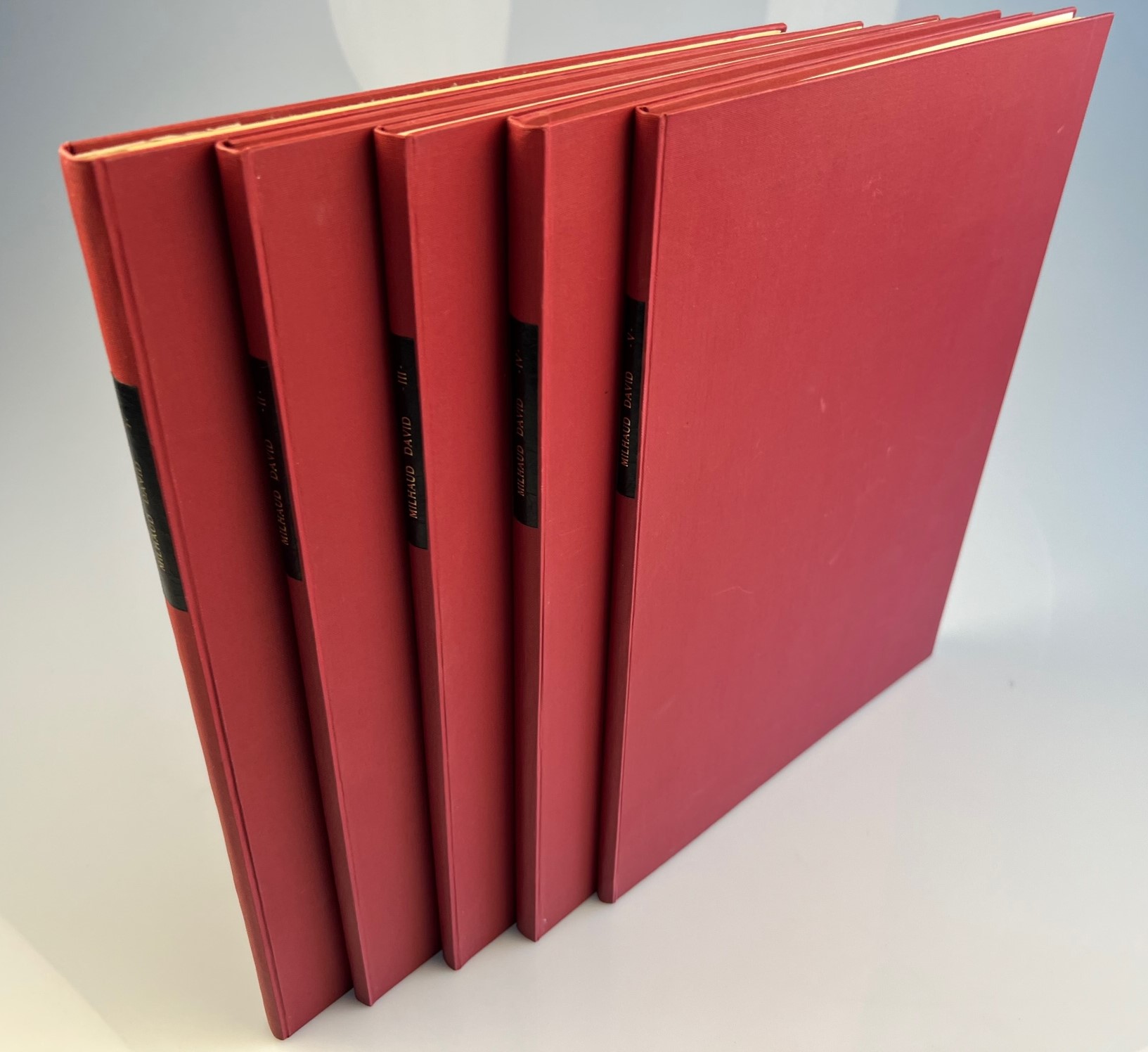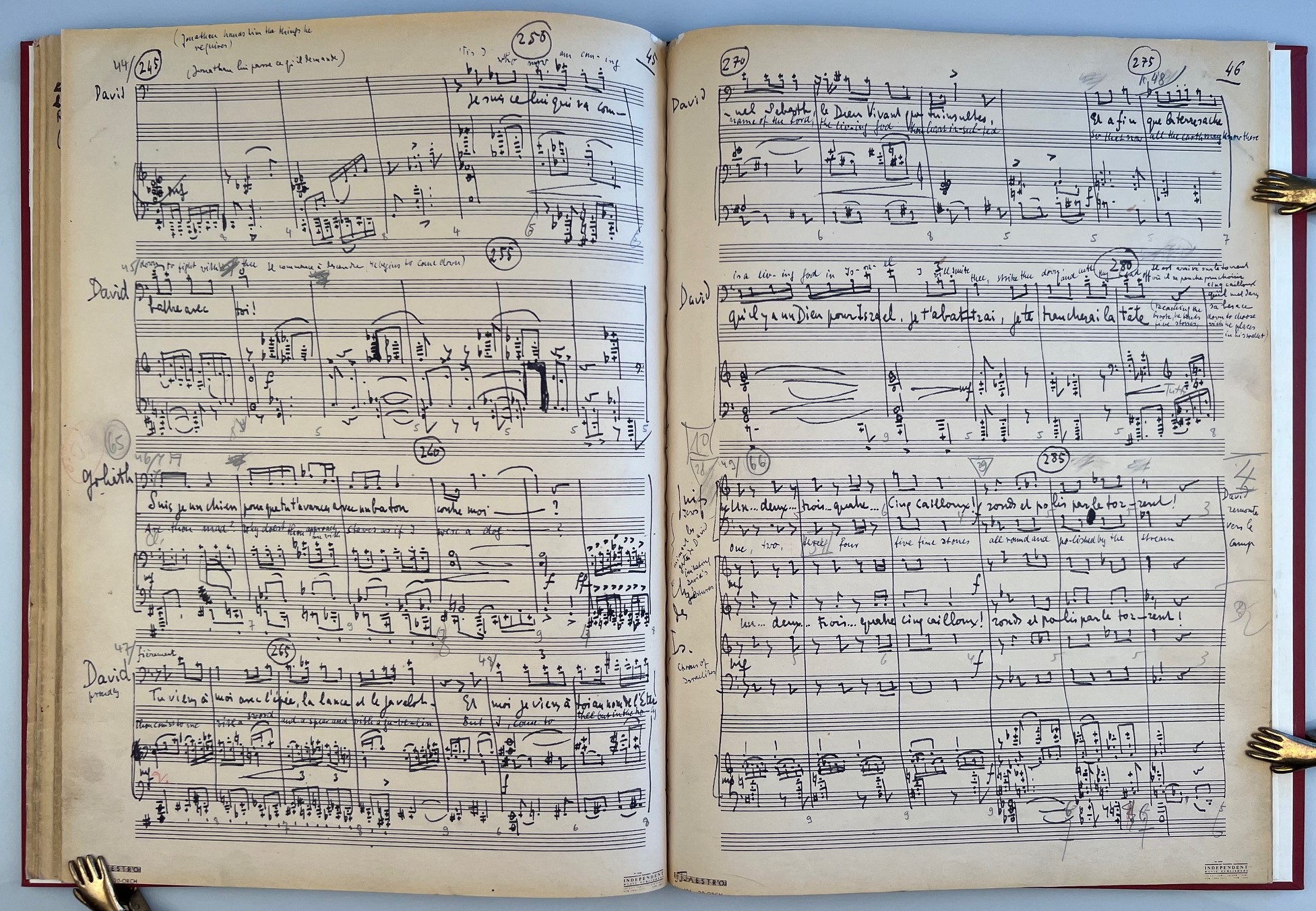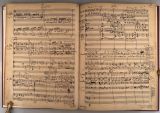MILHAUD, D.: David. Opéra en cinq Actes et douze tableaux. Livret d'Armand Lunel, musique de Darius Milhaud. Facsimile of the autograph manuscript of the piano reduktion - Klavierauszug. Printing Template - Druckvorlage. (Aspen 28. August bis 6. November 1952). Folio. 5 Leinenbände.
Artikelnummer: 18495
980,00 €
Steuerbetrag
Standardisierter Preis / kg:
-
PRINTING TEMPLATE – IMPORTANT SOURCE DOCUMENT This copy as facsimile of the original Milhaud manuscript was used by the engraver of Israeli Music Publications as printing template for the first and only edition of the piano reduction, which appeared in 1954. In addition to the numerous entries by the engraver, there is a handwritten English translation in Act 1 by another hand, which is of particular importance since the print is only in Hebrew and French. Milhaud's handwriting becomes more cursory from Act 2 onward, and some measures are corrected for the printed version. - The opera was written at the suggestion of S. Koussevitzky to celebrate the 3000th anniversary of the elevation of Jerusalem to the capital of the people of Israel. The musical text is preceded by the dedication of the work to the people of Israel, which appears in the printed version in an altered form. Milhaud himself described the premiere on 1.6.1954 in Jerusalem as one of the most moving moments of his life. "The singers ... sang their own story, and the audience participated in the glorification of its national hero. ... At the end of Act 3 ... a collective convulsion seized the audience, and as the chorus of 'Jerusalem' unfolded, one had the feeling that all were filled with one breath" (Notes Without Music p. 241). In the composition Milhaud succeeds in synthesizing disparate stylistic devices such as echoes of Jewish folklore, classicism, folk simplicity, and Baroque pathos (Melos 1954, 230). - Print version CPM 39, 319; not in PEM; not recorded in M. Milhaud, Cat. Milhaud recorded. - BEDEUTENDES QUELLENDOKUMENT ZUR DRUCKLEGUNG - Bei dem Exemplar handelt es sich um den Klavierauszug als Faksimile des eigenhändigen Orginalmanuskripts von Milhaud, das dem Stecher von Israeli Music Publications für den 1954 erschienenen Druck als Vorlage diente. Zu den zahlreichen Eintragungen des Stechers kommt im 1. Akt von anderer Hand eine handschriftliche engl. Übersetzung hinzu, die von besonderer Bedeutung ist, dass der Druck nur in Hebräisch und Französisch ist. Die Handschrift Milhauds wird ab dem 2. Akt flüchtiger, manche Takte werden für die Druckfassung korrigiert. - Die Oper entstand auf Anregung von S. Koussevitzky zur Feier des 3000. Jahrestages der Erhebung Jerusalems zur Hauptstadt des Volkes Israel. Dem Notentext ist die Widmung des Werkes an das Volk Israel vorangestellt, die in der Druckfassung in veränderter Form erscheint. Die Uraufführung am 1.6.1954 in Jerusalem bezeichnete Milhaud selbst als einen der bewegendsten Augenblicke seines Lebens. "Die Sänger ... sangen ihre eigene Geschichte, und das Publikum nahm an der Verherrlichung seines Nationalhelden teil. ... am Ende des 3. Akts ... bemächtigte sich eine kollektive Erschütterung der Zuschauer, und während sich der Chor 'Jerusalem' entfaltete, hatte man das Gefühl, dass alle von einem Atem erfüllt seien" (Noten ohne Musik S. 241). In der Komposition gelingt Milhaud die Synthese disparater Stilmittel wie Anklänge an jüdische Folklore, Klassizismus, volkstümliche Schlichtheit und barockes Pathos (Melos 1954, 230). - Druckfassung CPM 39, 319; nicht in PEM; nicht in M. Milhaud, Cat. Milhaud erfasst.






